
Dear Fashion: Let’s Step Up and Get Aligned
In a recent opinion editorial with WWD, CEO Colin Browne argues fashion needs to take more serious and coordinated action on sustainability. Read the highlights here!
Andrew Martin, EVP at Cascale, traces his visit to Hong Kong-based manufacturer Epic Group’s CIPL facility in Bangladesh showcasing sustainable innovation and a responsible future ahead.
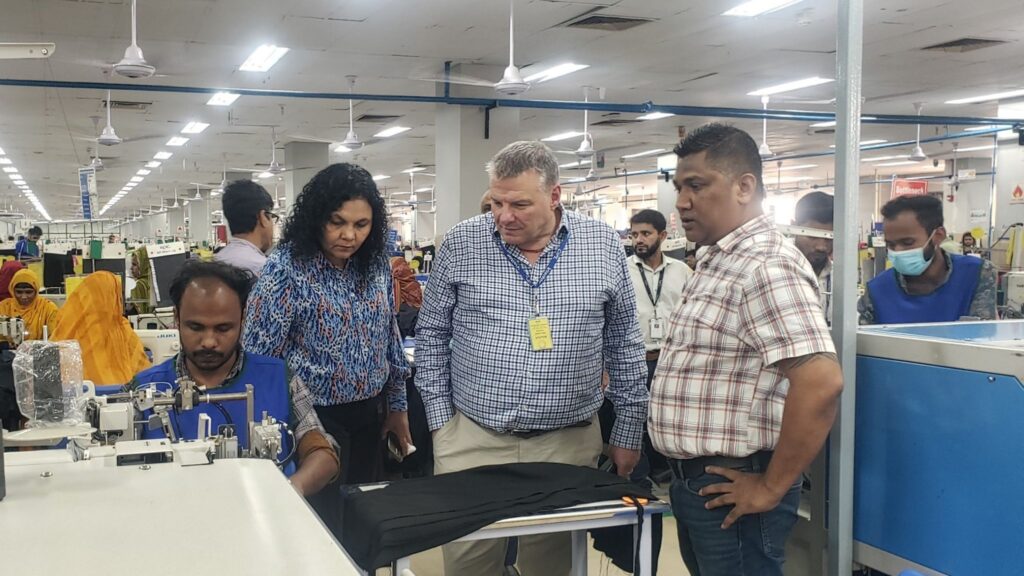

It’s one thing for a company to talk about their sustainability commitments, and it’s another thing entirely to show them off – and invite someone into their production lines for a closer look.
In Bangladesh earlier this year, I had the privilege of touring Cascale member Epic Group’s CIPL facility. Like Cascale, Hong Kong-based manufacturer Epic Group is committed to improving the way they do things. This commitment, or “Relentless Pursuit of Better” as they’ve called it, equates to a sizable impact across their 200 production lines and 9 facilities (to the tune of 120 million garments per year)! Since 2005, they have continued to push their standards in delivering value-added, world-class manufacturing in apparel that favors quality, value, and sustainable innovation.
What is Epic Group’s innovation exactly? During my tour, I saw how continued investment in new factories and technology pays for itself in the long haul. I witnessed the first-hand investments made in automation, RFID-based production tracking, worker performance systems, and upgraded laundry machines. I also observed their state-of-the-art Effluent Treatment Plant, which meets Zero Discharge of Hazardous Chemicals (ZDHC) aspirational discharge standards and reuses 50 percent of treated effluent back into operations. This is essential given the uphill battle of wages, energy, and data costs. More important than ever is standardization, accelerating away from proprietary requests and moving towards convergence.
So what does that mean at an assessment level? I had really great robust conversations with Vidhura Ralapanawe, (Epic Group’s executive vice president, Sustainability & Innovation and Cascale Board Director) and the team, and we all agreed that assessments need to adapt to the times, meaning satisfying standardized industry-wide accepted reporting requirements while adapting to current and upcoming regulations. However, beyond this it was clear that further expectations should be razor focused only on setting up factories for improvements over time, while avoiding the addition of unnecessary burdens sometimes often imposed by individual companies that don’t add value to performance improvement. After all, this is at the very core of Cascale’s origin story.
We had productive discussions on Epic Group’s ongoing sustainability journey and future goals to halve their water and carbon footprints by 2030.
Because let’s not forget – this year is a pivotal year. We can’t tolerate climate commitments falling by the wayside. Scientists warned of surpassing critical limits, and February marked a year-long trend of global temperatures above the 1.5-degrees Celsius according to the European Union’s Copernicus Climate Change Service. It’s why the efforts of global manufacturers like Epic Group matter and must be complemented by collective efforts across people and planet.
Though I’ve seen many factories in my 30-year career in global textile supply chains – from development of Olympic and World Cup-winning performance fabrics to operational improvements in factories – this tour left me with deeper inspiration.
I’m excited about how Cascale and Epic Group can continue to collaborate to raise sustainability standards across the apparel industry through collective action with brands, manufacturers, and other stakeholders – including elected officials. With the European Union’s recent approval of the Corporate Sustainability Due Diligence Directive (CS3D), which is a positive step forward, I am motivated to see how responsibility becomes the norm.
In June, Cascale, formerly the Sustainable Apparel Coalition, welcomed over 200 attendees and 25 industry speakers to the Manufacturer Forum: Shanghai.
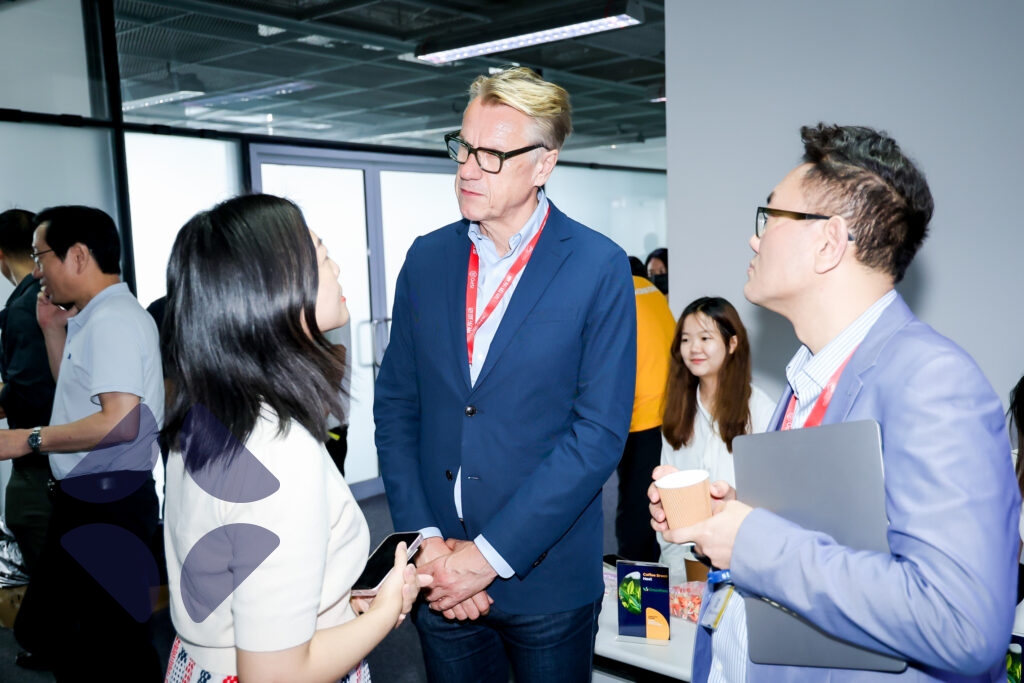
In June, Cascale, formerly the Sustainable Apparel Coalition, welcomed over 200 attendees and 25 industry speakers to the Manufacturer Forum: Shanghai.
The day-long event, held in collaboration with ISPO Shanghai, is part of Cascale’s ongoing event series that amplifies the voices of manufacturers around the globe.
Building on the “Catalyst for Change” theme, which has linked the organization’s recent manufacturer-led events in Bangalore, Dhaka, and Shenzhen, Cascale’s Manufacturer Forum: Shanghai featured targeted programming designed to address local challenges faced by manufacturers. This included solutions provided by the Higg Index, as well as Cascale’s growing list of impact initiatives, including the Manufacturer Climate Impact Program (MCAP).
It was the first Cascale event for Colin Browne, who became Cascale’s CEO in May. His attendance is a testament to his commitment to engage with manufacturers, understand their concerns and challenges, and elevate their voices on the global stage. This mission-critical approach from Cascale was further supported by the attendance of Board Member Dr. Delman Lee, vice chair at TAL Apparel Limited, and Scott Raskin, CEO of Worldly, the leader in environmental and social impact data for the apparel and footwear industry, which provides the exclusive platform for Cascale’s Higg Index tools.
In his opening address to the manufacturer-heavy crowd, Browne commented: “Part of my job is to amplify the voices of the experts and the manufacturers are the key experts in helping to solve many of the challenges we face today. […] I chose this as my first place to come and speak because it is so incredibly important to me that we work with manufacturers to find a way to bring your voices to the table.”
The Shanghai event reinforced the organization’s commitment to support an open exchange between manufacturers and better understand their needs and ongoing challenges to jointly develop solutions. With attendees reflecting the entire value chain – including manufacturers, service providers, industry stakeholders, strategic partners, brands and retailers, NGOs, academia, and government officials – the event facilitated pre-competitive collaboration in order to share best practices and collectively address critical challenges. Key discussions included:
Event sponsors included Benchmarks, TÜV Rheinland, Worldly, ESTS Global, GreenPont, and Stantec. Click here to learn more about Cascale’s Manufacturer Forums.

Cascale’s ongoing event series amplifies the voices of manufacturers around the globe; event to be held in collaboration with ISPO Shanghai.
Amsterdam, Hong Kong, Oakland (CA) – June 6, 2024: Cascale (formerly the Sustainable Apparel Coalition) will host Manufacturer Forum: Shanghai on June 28, part of an annual series of events designed to amplify the voices of manufacturers around the globe. Featuring targeted programming designed to address local challenges faced by manufacturers, the event will highlight solutions provided by Cascale’s Higg Index suite of tools and growing list of impact initiatives. The event takes place at the Shanghai New International Expo Center in collaboration with ISPO Shanghai, the unique, multi-segment summer trade show.
Following successful runs in Bangalore, Dhaka, and Shenzhen, Manufacturer Forum: Shanghai will further facilitate pre-competitive collaboration in order to share best practices and collectively address critical challenges. Keynote speakers include Colin Browne, the organization’s newly-appointed CEO, and Scott Raskin, CEO of Worldly, Cascale’s technology partner and event sponsor.
“China is a premiere production hub and manufacturers here are truly the architects of transformation,” Browne said. “From combating climate change to delivering decent work for all and building a nature-positive future, manufacturers are critical to achieving our collective goals. It’s a priority for me to foster collaboration with manufacturers around the world. Together, we will co-create solutions that will transform the consumer goods industry into one that gives back more than it takes to people and the planet.”
“Many of Worldly’s customers are manufacturers based in China, and I am looking forward to engaging with them at the Manufacturer Forum hosted by Cascale in Shanghai,” said Scott Raskin, CEO of Worldly. “Manufacturers are crucial in driving social and environmental impacts. In partnership with Cascale, we will strengthen our collaboration with these manufacturing facilities, equipping them with advanced tools and insights to meet their sustainability objectives and fortify their relationships with their brand partners.”
Reflecting “Catalyst for Change,” the current theme of Cascale’s Manufacturer Forum series, the Shanghai event reinforces the organization’s commitment to support an open exchange between manufacturers and better understand their needs and ongoing challenges to jointly develop solutions.
Over 200 attendees are expected to attend the event, which brings together manufacturers with business leaders and critical stakeholders. Programming will cover a wide range of topics, including what manufacturers need to know about global policy, how strategic partnerships can drive industry change, the evolution of Higg FEM and verification processes, and the latest on decarbonization impacts. To aid goal and target-setting, there will also be dedicated training on setting Science-Based Targets for decarbonization, as part of an evolving and interactive program. Click here for more information and/or to register. Event sponsors currently include Worldly, Benchmarks, TÜV Rheinland, ESTS Global, and Stantec.
ABOUT CASCALE
Cascale is the global nonprofit alliance empowering collaboration to drive equitable and restorative business practices in the consumer goods industry. Spanning over 300 retailers, brands, manufacturers, governments, academics, and NGO/nonprofit affiliates around the globe, we are united by a singular vision: To catalyze impact at scale and give back more than we take to the planet and its people. Formerly known as the Sustainable Apparel Coalition, Cascale owns and develops the Higg Index and a unified strategy for industry transformation.
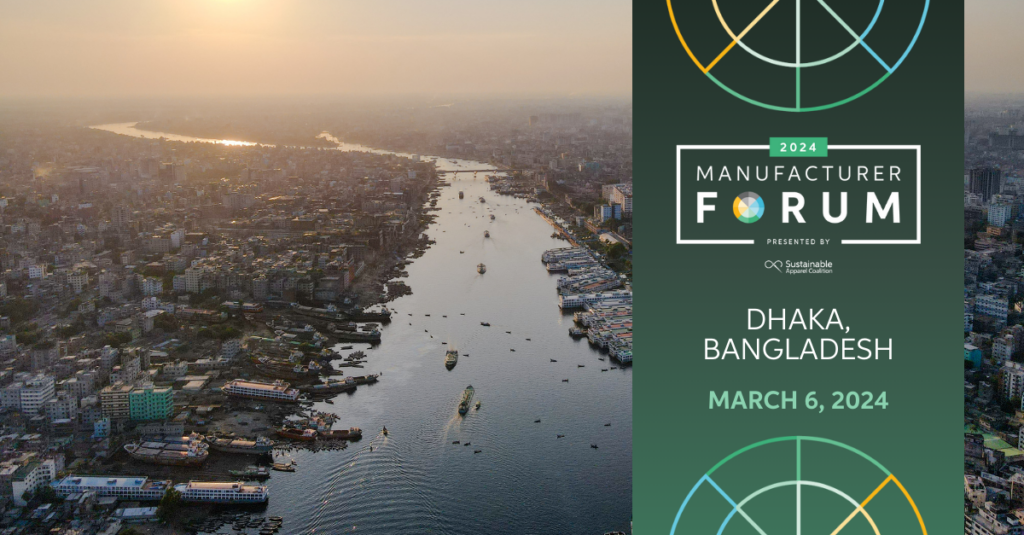
San Francisco, Amsterdam, Hong Kong – February 14, 2024: The Sustainable Apparel Coalition (SAC) will host its first Manufacturer Forum of 2024 on March 6 in Dhaka, Bangladesh; the event will be held alongside the Sustainable Apparel Forum, which will be hosted by the Bangladesh Apparel Exchange on March 5. Reflecting the theme “Catalyst for Change,” the Manufacturer Forum: Dhaka will underscore the pivotal role of manufacturers to set and achieve goals that are transforming the consumer goods industry, highlighting the unique challenges they face and providing support for collaborative solutions.
Over 200 attendees are expected at the Manufacturer Forum: Dhaka, where they will gain insights into the newly launched Manufacturer Climate Action Program (MCAP), the Higg Index suite of tools, and critical policy developments. Participants can also receive hands-on training in and get certified in setting Science-Based Targets (SBTs) for decarbonization, as well as join interactive workshops on completing the Higg Facilities Environmental Module (FEM) 4.0, health and safety remediation plans, and workers rights.
“We are thrilled to host our inaugural Manufacturer Forum of 2024 in Bangladesh and privileged that such an important sourcing hub, known for its craft and expertise, will be the first place we will showcase a new era for the SAC,” said Andrew Martin, executive vice president, SAC, who will give the opening address. “Solving complex sustainability challenges requires a holistic approach that depends on data, tools, and stakeholder collaboration. Manufacturers are the engine that drives the consumer goods industry and this event in Dhaka provides invaluable opportunities for connection, learning, and support as we work together to take collective action for industry progress.”
In 2023, the SAC announced the return of its flagship Manufacturer Forums after a hiatus of in-person events amid the pandemic. Since then, the SAC held its July forum in Shenzhen, China followed by Bangalore, India in December. The events bring together manufacturers – who are on the front lines of critical action – with business leaders and stakeholders to discuss the future of sustainability, supply chain compliance, verification, policy alignment, and more.
“SAC’s Manufacturer Forums are a valuable opportunity to connect and take action on the goals that unite us,” said Arindama Banerjee, associate director, client services/responsible sourcing at ELEVATE – An LRQA Company, the industry leader in sustainability and supply chain services globally. “We are thrilled to participate again this year.”
Dr. Vidhura Ralapanawe, executive vice president, Epic Group and SAC board director, and Dr. Laxmikant Jawale, regional lead, South Asia & Southeast Asia, Apparel Impact Institute (Aii), will speak at the event. Additional speakers include SAC global team members and SAC members Primark, ELEVATE, a LRQA Company, and CYCLO® recycled fibers, among others. Representatives from organizations with which SAC collaborates, including Bangladesh Apparel Exchange (BAE), Bangladesh Garment Manufacturers and Exporters Association (BGMEA), Deutsche Gesellschaft für Internationale Zusammenarbeit (GIZ) GmbH, and the Social & Labour Convergence Program (SLCP), among others, will also present.
SAC’s Manufacturer Forum: Dhaka is sponsored by Worldly, the leader in environmental and social impact data capture and analytics for the apparel and footwear industry, and the exclusive platform for the SAC’s Higg Index suite of tools; those interested in sponsorship can contact sacmeetings@apparelcoalition.org. The full list of speakers, as well as information on registration, is available on the SAC’s website. Collaborative opportunities at Manufacturer Forum: Dhaka are critical to driving equitable and restorative business practices related to the SAC’s three core pillars: Combat Climate Change, Decent Work for All, and Nature Positive Future.
— END —
About the Sustainable Apparel Coalition
The Sustainable Apparel Coalition (SAC) is a global, non-profit alliance of over 300 organizations in global apparel and consumer goods. Initially formed to create standardized sustainability metrics, the SAC has sharpened its focus to driving pre-competitive, collective action across three foundational pillars. As an independent entity, the SAC brings together brands, retailers, manufacturers, NGOs, academics, and industry associations to combat climate change, ensure decent work, and contribute to a nature-positive future. Central to the SAC’s mission is the Higg Index, a suite of comprehensive tools that empower members to measure, evaluate, and improve sustainability performance across the supply chain. To support evolving industry needs, the SAC also brings together a focus in policy, transparency, and programs for collective action.
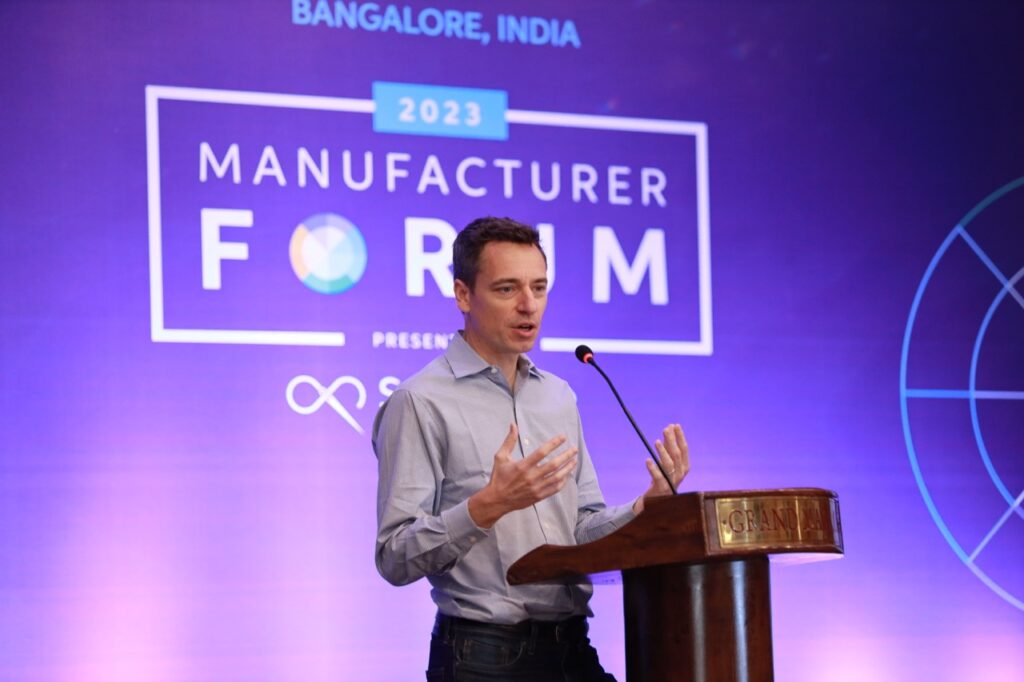
Over 200 in-person attendees joined the Sustainable Apparel Coalition (SAC), for the second edition of its Manufacturer Forum, on December 4, 2023 in Bangalore, India. Building on the theme, Catalysts for Change, the event brought together business leaders and stakeholders to discuss the future of sustainability, supply chain compliance, verification, policy alignment, and more.
“The use of the Higg Index tools is just one step of many that we must take to solve the most complex sustainability challenges for the sector,” said Jeremy Lardeau, vice president Higg index at the SAC. “This is why we do not stop at delivering data and tools, but also develop programs and events like Manufacturer Forums, where stakeholders can come together and take collective action for industry progress.”
Dr. Vidhura Ralapanawe, executive vice president at Epic Group and an SAC board director delivered a thoughtful keynote, calling for urgent action to combat climate change. “How much we do, and how fast we work to decarbonize, and how much we aspire to achieve is on us. Because climate change is not happening in 2030 or 2050, it’s happening now. This is our chance, our choice,” Ralapanawe said.
Dr. Laxmikant Jawale, regional lead for South Asia & Southeast Asia at the Apparel Impact Institute (Aii), and Erlinda Lee, director of global membership development from the SAC, delved into a discussion that explored the dynamic collaboration between the SAC and Aii. The session allowed attendees to gain a deeper understanding of the mission, purpose, and collaborative efforts of both organizations to propel the industry forward. It also provided valuable knowledge on how to leverage programs offered through the partnership to effectively tackle the challenges associated with decarbonization and how manufacturers can get involved
Later that day, sessions explored critical issues including climate change, how policy and legislation impacts manufacturers, and the evolving landscape of sustainability verification.
Ringo Yu, manager of the SAC’s Manufacturer Climate Action Program (MCAP) highlighted the compounding impact of climate change, such as how extreme heat waves, torrential rain, and flooding impacts India’s community, natural environment, and economy. He shared that there’s currently a low level of science-based target adoption in the apparel, footwear, and textile sector. He shared insights on the newly launched program and how the SAC is spearheading and amplifying industry initiatives for combating climate change. The program aims to accelerate the number of manufacturers at corporate level to set science-aligned targets for scope 1 and 2, enhance their understanding on climate change related risks, and explore opportunities to take climate actions. “It is important to pursue a leadership mindset first and take action individually to drive change collectively by participating in programs such as the MCAP,” Yu said.
Gauri Sharma, assistant general manager of communications and sustainability innovation at Shahi Exports Pvt Ltd. joined Mousumi Sarang, country manager for India at the Fair Wear Foundation to discuss the intricacies of current and future policy challenges in the textile industry. ”Legislations built and shaped in the Global North have a deep cascading effect in the supply chain, Sharma said. “Hence in the Global South, it is important to develop an understanding of what these means for manufacturers.”
Angela Ng, director of Higg Facility Tools at the SAC, Janne Koopmans, head of collaboration at ZDHC, and Yashinth Wijerathne, manager of environmental sustainability at Hirdaramani Apparel, discussed the recently launched Higg FEM 4.0 and its vital role in standardized measurement and accurate reporting. “The Higg FEM 4.0 allows manufacturers to see what is really important and evolve from there,” Ng said.
Dhawal Mane, director of training and verification at the SAC, and Jeremy Lardeau, SAC vice president of Higg Index, presented on the evolving landscape of sustainability verification within the industry. “Higg FEM verification growth over the past 5 years has demonstrated the collaboration of SAC members on a shared environmental assessment. It is time to simultaneously invest in value through evolving our approach for verification. Our Core verification approach this year is the first step in that direction,” Mane said.
Attendees also received training to support their Higg FEM 4.0 self-assessment, get certified in setting Science-Based Targets, and develop plans for health and safety remediation and workers rights.
The SAC announced the return of Manufacturer Forums earlier this year, with the first in-person event taking place in Shenzhen, China on July 25 at Sheraton Shenzhen Futian Hotel. This was the first in-person Manufacturer Forum the SAC had hosted since 2019.
The Bangalore Manufacturer Forum online photo gallery is available here. Manufacturers who are interested in participating in an upcoming Manufacturer Forum can click here to subscribe for updates.

Kaley Roshitsh, SAC editorial director, attended the Sourcing Journal Fall Summit for a deep dive into sourcing, as the pinnacle holiday sales season approaches. The event convened executives across sustainability disciplines for sessions on the politics of trade, managing volatility in supply chains, benchmarking and scaling circularity while securing garment provenance, among others.
Circularity Definition “Disconnect”
At the conference, presentations underscored the fact that circularity is still top of mind – but circularity awareness is lagging despite perceived momentum, according to a 2023 circularity survey from Cotton Incorporated and Sourcing Journal. Melissa Bastos, director of corporate strategy and insights at Cotton Inc., reported findings of an “industry disconnect” and “a lot of confusion” around circular fashion. Per the survey, some 55 percent of consumer respondents were “unsure” of circularity’s meaning yet 40 percent were also “interested” in repair, resale and circular clothing avenues.
Meanwhile, 84 percent of industry executives said circularity influences design choices, and 69 percent reported interest in donating old products to be upcycled into housing insulation – the objective of Cotton Inc.’s “Blue Jeans Go Green” circularity program. Cotton Inc., along with Better Cotton, Cotton Connect, and the U.S. Cotton Trust Protocol are members of the Sustainable Apparel Coalition.
Manufacturer-First Focus
Manufacturing challenges were also a hot topic. “There is a gap in the market between what is demanded and what is required,” said Ebru Debbag, executive director-global sales and marketing at Soorty Enterprises Pvt. Ltd., in a session on supply chain volatility. She called for a stronger leadership proposition to prioritize suppliers in the decarbonization journey. According to Debbag, the company set their science-based emissions target of 54 percent, and aligned it with a transition to organic cotton.
Throughout the day, panelists agreed that suppliers are challenged by the costs of decarbonization. “We can’t go green if we’re in the red,” said Jasmin Malik Chua, sourcing and labor editor at Sourcing Journal, quoting a separate conversation with a manufacturer source.
Compliance, Provenance of Growing Concern
At a panel on compliance, speakers agreed that transparency is paramount to sustainable fashion brands. “The amount of visibility that is expected is only increasing,” said Marissa Brock, director, marketing and policy at Sourcemap, who was joined by executive panelists from Supima, Oritain and Alice & Olivia. Buxton Midyette, vice president marketing and promotions at Supima, said tracing Supima fibers, and fibers generally, is a “longstanding challenge,” and not one without its costs. Supima depends on 300 family farms in the U.S. for their fiber, and all hold a vested interest in identifying and tracing their cotton fibers in depth.
Ben Tomkins, vice president of retail sales at Oritain, added there is a “superficial level of compliance on supplier declarations,” which highlights the need for alignment at the ground level so suppliers aren’t stuck with duplicate audits.
In a separate conversation about textile recycling, Bryan Timm, Recover’s chief strategy officer, explained the company’s ongoing partnership with Oritain to identify cotton waste streams. “[The] Holy grail is to recycle the clothes you’re wearing, [and the] only way to do that is design with circularity,” Timm said. He also noted that the policy gaps around circular fashion are multifold but relevant to both Democrat and Republican lawmakers, who see the U.S. Uyghur Forced Labor Prevention Act (UFLPA) as “100 percent bipartisan.” However, he emphasized, “as a supplier, you have to be responsible for what happens in your supply chain.”
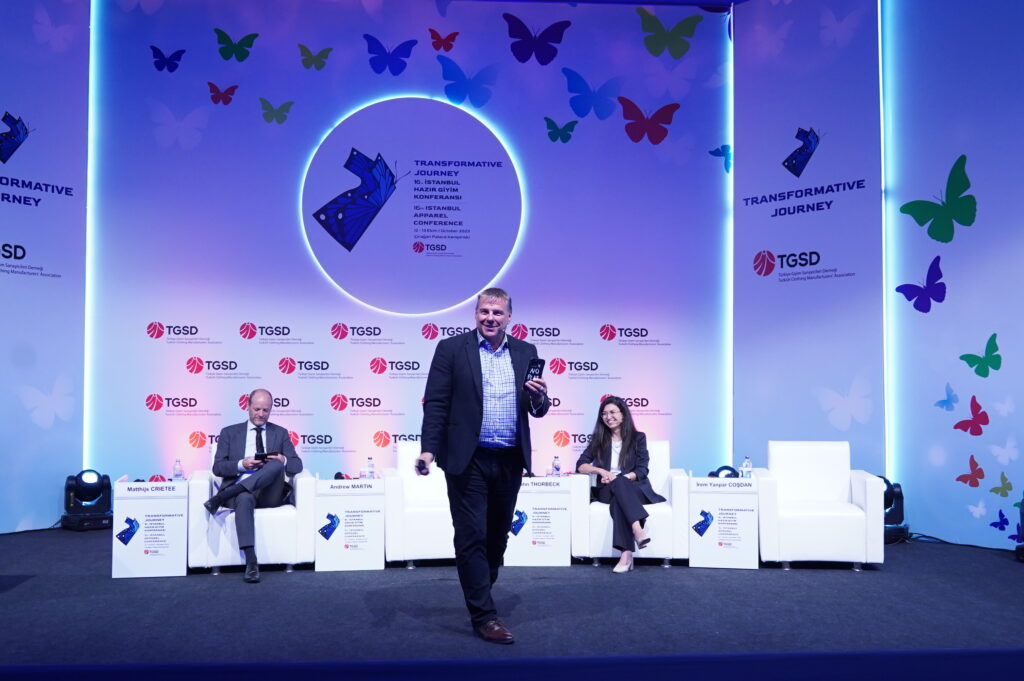
Reflecting the Istanbul Apparel Conference’s 2023 theme, “Transformative Journey,” SAC Executive Vice President Andrew Martin shared information about Responsible Purchasing Practices (RPP) as part of a panel discussion on “Improving the Terms of Trade for Apparel Manufacturers.” Moderated by Matthijs Crietee, Secretary General of the International Apparel Federation (IAF), with whom the SAC recently announced a strategic collaboration, the panel also included Irem Yanpar Coşdan, Stakeholder Engagement Manager at Open Supply Hub, as well as a pre-recorded video presentation from John Thorbeck, Chairman of Chainge Capital LLC.
After sharing background information about the SAC, the global multi-stakeholder nonprofit alliance that represents a diverse global membership of over 280 members – about 50% of the apparel and textile industry – in 36 countries, Martin explained how the organization’s work is anchored by the Higg Index, a suite of tools that measures social and environmental impact. He then outlined the important role of RPP in the SAC’s revised strategic focus on “evolution for impact,” which centers around three key pillars: combat climate change, decent work for all, and nature positive future. “Our goal is to transform business for exponential impact through groundbreaking programs and tools, collaborative partnerships, and trusted leadership on industry sustainability,” Martin said. “Responsible purchasing practices are critical to achieving these goals; as we will never achieve our climate, work, and nature goals without responsible purchasing practices at the core.”
Martin explained that inequalities in textile and apparel supply chains hold the industry back, and that everyone at every stage of the value chain should be engaged in partnership to create a more just and resilient industry: “We need more equitable apparel supply chains to unlock a fairer and stronger industry where everyone is treated with respect and dignity. Without responsible purchasing practices, suppliers can be left in precarious financial positions. This not only translates into poor wages and working conditions for those on the factory floor, but also fails to address the investments needed to ensure an equitable decarbonisation of the industry.”
He shared how the SAC is supporting industry alignment, focus and implementation of Responsible Purchasing Practices, through collaboration with leading industry actors. As part of the recent update to the Higg Index Brand & Retail Module (BRM), released in March 2023, the Common Framework for Responsible Purchasing Practices informed the RPP questions, which were developed in collaboration with Fair Wear and the Sustainable Terms of Trade Initiative (STTI). Today, 43% of questions in the Higg BRM relate to RPP. Martin also detailed how the collaboration between the SAC, Fair Wear, and the International Apparel Federation (IAF) will evolve to establish responsible purchasing practices at the heart of fostering more equitable partnerships between buyers and suppliers, ”This will be supported by generating company and industry insights, informing training, setting roadmaps, exploring root causes and much more. Through the tools we are evolving, and the partnerships we have built, we are demonstrating our commitment to accelerating responsible purchasing practices as a key lever in realizing systemic industry transformation,” Martin said.
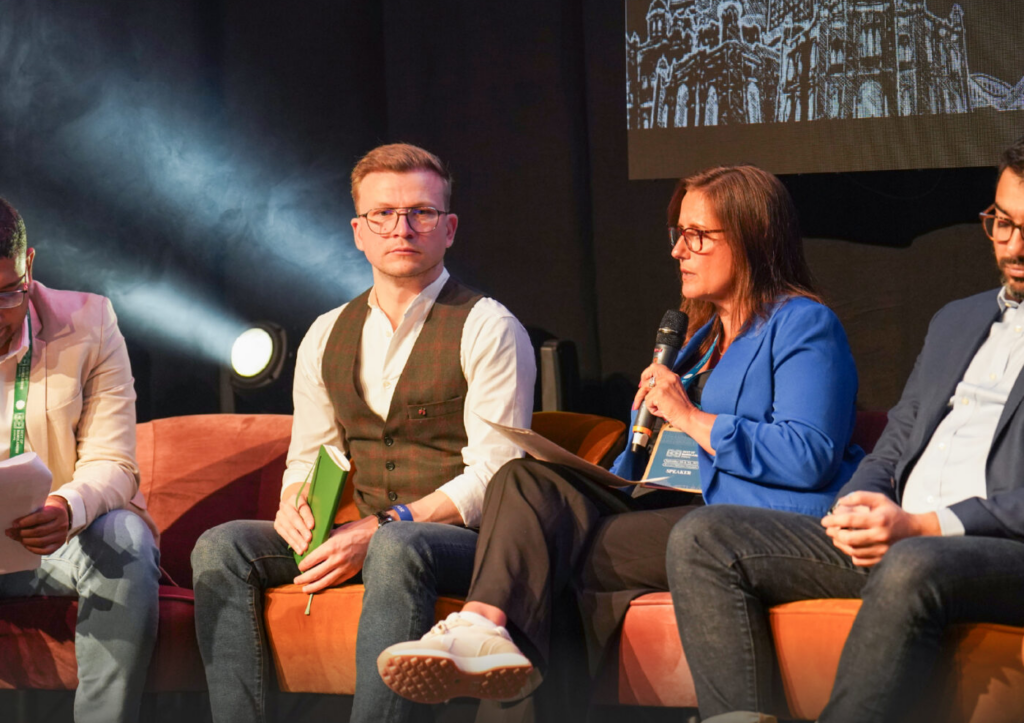
At a recent event hosted by Best of Bangladesh in Amsterdam, Lisa Domoney, SAC’s Senior Director of Membership and Corporate Engagement, discussed “Sustainable Sourcing Realities: Challenges, Achievements, and Next Steps” on a panel moderated by Omar Gias, Director, Strategic Engagement at the Bangladesh Apparel Exchange. The focus of the discussion was to explore how sustainable practices can combat critical issues related to the fashion industry’s environmental and social impact, especially in light of its rapid growth.
“The event was filled with optimism and hope,” Domoney said. “It celebrated the successes and incredible progress made in Bangladesh over the last decade, but that there is still a long way to go.” She was joined by Andrei Vasiliev, Responsible Sourcing/Social Impact Manager for Bestseller, Syed Tanvir, Managing Director of Pacific Jeans Limited, Joris Aperghis, CEO of WE Fashion, Rensje Teerink, Deputy Director of the Asia-Pacific Department at EEAS, Willeke Hendriks, Director of Global Sourcing & Product Development at G-Star RAW, and Karin Reimerink, CR Senior Director at PVH Europe.
The session was a pivotal moment for addressing the ethical considerations and responsible sourcing practices that are essential to transformation of the apparel industry sustainably. Vasiliev highlighted the importance of protecting worker rights and detailed how Bestseller has empowered more than 20,000 women in Bangladesh through the RISE program. Tanvir shared the impact of sustainability initiatives such as water recycling and clean energy, as well as the work that Pacific Jeans is doing in Bangladesh to provide university scholarships to women workers and vision care for all. Aperghis called for consumer education on sustainability and the benefits of legislation to support these goals, while highlighting the work that WE Fashion is doing on sustainability for the brand. Teerisk also called for clear legislation and explained how the EU is moving towards carbon neutrality, while exploring how developing economies with large textile industries can be supported in their transition to more sustainable manufacturing practices. And Hendriks shared the strategies that G-Star has embraced to reach a 30% GHG reduction by 2030, including producing locally and choosing more sustainable materials.
Domoney underscored the SAC’s vital role and vision for the industry, emphasizing the work of member companies that use the Higg Facility Social & Labor Module (FSLM) and the Higg Facility Environmental Module (FEM) to achieve social and environmental goals, as well as the SAC’s unwavering commitment to collaborative efforts that drive positive change. Her presentation was complemented by Reimerink’s discussion of PVH Europe’s ethical sourcing program, which utilized the Higg FEM to establish baseline data, as well as their collaboration with Better Work.
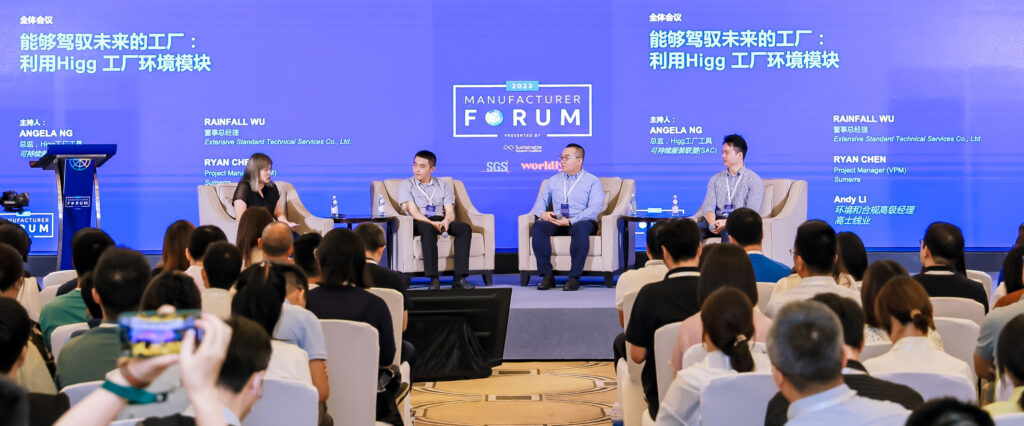
After a four-year hiatus, the Sustainable Apparel Coalition returned to hosting in-person Manufacturer Forums with the “Catalyst for Change” event in Shenzhen, China. SAC Manufacturer Forums are a series of action-oriented events aimed at bringing together business leaders and stakeholders for solution-centered discussion on how to drive sustainability improvements throughout global supply chains.
The event gathered 180 participants at the Sheraton Shenzhen Futian Hotel for sessions on policy, supply chain dynamics, decarbonization, standardizing facility data collection, verification, and more. Attendees learned about how the SAC and its member organizations collectively work together to drive improvements in the apparel, footwear, and textile industry.
Sing Bin Lim, Head of Hub Asia at bluesign technologies, kicked off the event with a keynote that emphasized the need to address climate change at the country level — as well as the challenges faced by facility owners and even individuals who are unsure how to tackle such a vast objective. Lim highlighted solutions found through increased knowledge and collaboration — both upstream with financial institutions and downstream with customers — which is demonstrated by SAC’s collaboration with the Apparel Impact Institute (Aii), Textile Exchange, and ZDHC on the Apparel Alliance, as well as the SAC’s ongoing partnership with Worldly, which helps brands report on essential data, including carbon emissions, through use of the SAC Higg tools.
The critical need for data was echoed by the SAC’s Angela Ng, Director of Higg Facility Tools, who introduced the Social & Labor Convergence Program (SLCP)’s new WE Tech worker engagement program. Ng highlighted the difference between the SLCP’s Converged Assessment Framework (CAF) and the Higg Facilities Environmental Module (FEM) and how scoring is applied to make the industry fair together. SAC’s Betty Li, Senior Manager of Membership Engagement for Asia-Pacific (APAC), honed in on how increased scrutiny and regulation allow companies to analyze data and show progress year over year.
Moran Zhang, a Research Analyst at the World Resources Institute’s China Climate and Energy Program, detailed the relevant policies that will impact manufacturers, including the EU’s Circular Economy Action Plan and the Green Deal, and introduced the Science Based Targets Initiative (SBTi) as a tool that can be used to track emissions. Zhang shared information from the “Roadmap to Net Zero: Delivering Science-Based Targets in the Apparel Sector” report [https://www.wri.org/research/roadmap-net-zero-delivering-science-based-targets-apparel-sector] that was published in 2021 by WRI and the Apparel Impact Institute (Aii), a SAC partner.
Jessica Jia, the SLCP representative in China, shared how the program is actively expanding to more industries such as accessories, furniture, and home decor. With 4.7k users and over 400 verifiers, China is the SLCP’s biggest user base by far. Jia shared information on the CAF 1.6, emphasizing how the updates have simplified the steps and optimized the data.
Attendees were also briefed on updates to the Higg Index suite of tools, including FEM 4.0, scheduled to launch later this year, and the SAC’s new Decarbonization Program. Discussions emphasized how important brands are to drive tools adoption.
“We were honored to have hosted industry stakeholders at our Manufacturer Forum,” said Jeremy Lardeau, Vice President, Higg Index. “As an organization committed to transforming business through groundbreaking tools and collaborative partnerships, we believe through initiatives such as the Manufacturer Forums, we can help solve the industry’s most urgent and systemic challenges.”
The SAC’s next Manufacturer Forum will take place this December 4 in Bangalore, India. Click here for more information and to save the date!

Forums provide opportunities for industry stakeholders to drive sustainability improvements throughout global supply chains
San Francisco, Amsterdam, Hong Kong – July 13, 2023: The Sustainable Apparel Coalition (SAC), an impact-driven global convener of nearly half of the apparel, footwear, and textile industry, is pleased to announce the return of its Manufacturer Forums, a series of action-oriented events aimed at bringing together business leaders and stakeholders to learn how they can leverage the Higg Index suite of tools and industry programs to drive sustainability improvements throughout global supply chains.
Under the theme, Catalyst for Change, the first Manufacturer Forum will take place in Shenzhen, China on July 25 at Sheraton Shenzhen Futian Hotel and will be the first in-person Manufacturer Forum the SAC has hosted since 2019. The event will feature sessions on policy, supply chain dynamics, decarbonization, standardizing facility data collection, verification, and much more.
The Manufacturer Forum will also offer attendees an opportunity to learn about the SAC and how its member organizations collectively work together to drive improvements in the apparel, footwear, and textile industry. Attendees will learn how to use the Higg Index suite of tools and stay up-to-date on recent tool updates like the FEM 4.0, scheduled to launch later this year, as well as industry programs such as the SAC’s newly launched Decarbonization Program.
Jeremy Lardeau, Vice President, Higg index at the SAC said: “We are honored to be hosting industry stakeholders at our Manufacturer Forum, which will provide attendees an opportunity to learn more about our work at the SAC and how to leverage our Higg index suite of tools to better understand data insights informing their sustainability strategies and how upcoming legislation will impact their operations. As an organization committed to transforming business through groundbreaking tools and collaborative partnerships, we believe through initiatives such as the Manufacturer Forums, we can help solve the industry’s most urgent and systemic challenges.”
Joyce Tsoi, Director of Collective Action Programs at the SAC said: “With time running out for us to reverse the worst impacts of climate change, we cannot afford to waste any more time. We are thrilled to bring together industry stakeholders for our Manufacturer Forum to discuss key issues impacting our industry, connect and share best practices on setting science based targets and the types of decarbonization actions required to reduce climate risk and build climate resilience. Through our Decarbonization Program, we are working collectively to build collective solutions to drive systemic change required in our global supply chains, which no one company can do alone. The Manufacturer Forum presents a great opportunity for us to deepen our collaboration and drive rapid progress at scale.”
As an organization that is deeply committed to collaboration, the SAC’s goal is to catalyze industry collaboration, bringing together individuals and organizations from across the entire value chain to reach shared industry goals. Through its Manufacturer Forums, the SAC aims to bring together driven and passionate professionals for solution-centered discussions to drive social and environmental impacts.
The Manufacturer Forum is open for interested participants to register and join other stakeholders in discussions and networking opportunities on how to accelerate progress to transform the industry.
– ENDS –
About the Sustainable Apparel Coalition:
The Sustainable Apparel Coalition (SAC) is an independent and impact-creating organization that aims to lead the industry toward a shared vision of sustainability based upon a joint approach for measuring, evaluating, and improving performance.
As a non-profit organization, it has members from across the apparel, footwear, and textile sector, but exists independently outside any one company so that it can drive progress. The SAC’s collective action efforts bring more than 280 global brands, retailers, manufacturers, NGOs, academics, and industry associations together. They represent about half of the apparel and footwear industry along the whole supply chain – from sustainability pioneers to organizations just getting started.
Before the SAC existed, companies worked in a siloed way, using their own programs and measurements that lacked standardization and an ability to drive collective action. In 2009, Walmart and Patagonia identified this as a serious problem. Joining forces, they brought together peers, competitors, and relevant stakeholders from across the sector to, on a pre-competitive basis, develop a universal approach to measuring sustainability performance and founded the Sustainable Apparel Coalition.
LinkedIn | Twitter | Instagram | Facebook | YouTube
要阅读新闻稿中文版,请点击此处。